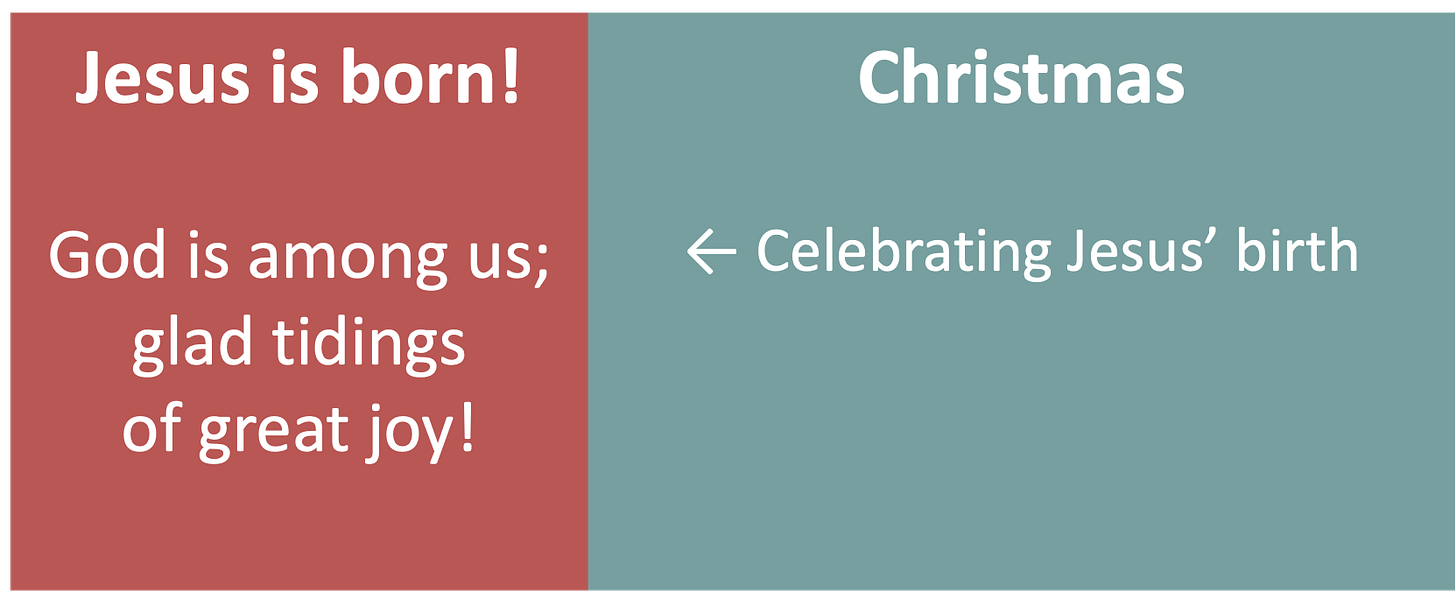One of my absolute favorite things each year is my church’s Nine Lessons and Carols service. It’s a traditional Advent service that has nine readings from Scripture about how Jesus’ birth fits into the big story of redemption; each reading is followed by one or two songs on the reading’s theme. We have some incredibly gifted musicians at our church, and each year is wonderful.
If you have time, you can stream this year’s service on YouTube today [Sunday, December 17 at 4 p.m. Central:
Also, here is last year’s service and here’s an album made a few years back of another one.
Advent: Bigger than Christmas
One thing you’ll note if you watch / listen to our lessons and carols service is that it starts in a different key than you might expect. A lot of the early songs are about longing, anticipation, or even suffering, which jars with the cultural Christmas season that gets celebrated now.
That’s because “Advent,” which is from the Latin for “coming” or “arrival,” isn’t just hip-Christianese for “Christmas.” The historic Advent season tells a bigger story.
Today, cultural Christmas is kind of emotionally one-note. It’s all cheerfulness, rooted (whether people think about it or not) in celebrating the advent of Jesus into the world:
And that’s wonderful – it is something to celebrate! That God the Son would become incarnate as a baby, born as the heir of David and the presence of God himself on earth, is worth angels and men celebrating and seeking to become better versions of themselves for a brief time, year after year. If it inspires gaudy lights and festive songs and A Muppet Christmas Carol even Elf, I’m for [most of] it. Peace on earth, goodwill toward men!
Advent embraces that spirit.
And. (Not “but.”)
Anyone who’s been through the first Christmas after losing a loved one knows that the festivity of the season can make the loss more painful. Christmas can hurt; and the one-note cheerfulness can feel like papering over difficulty instead of facing it with real hope. The Advent spirit expands the scope of imagination beyond Jesus’ birth to include the full scope of redemptive history:
That means we don’t just celebrate the work God has done in sending Jesus; we also long for him to come back – the second Advent – and finish the work. To bring not the seed of peace, but the utter transformation of nature and the end of war forever. Not just goodwill toward men, but final reconciliation between God and humankind. Not just generosity, but the swallowing up of death in victory:
On this mountain the Lord of hosts will make for all peoples
a feast of rich food, a feast of well-aged wine,
of rich food full of marrow, of aged wine well refined.
And he will swallow up on this mountain
the covering that is cast over all peoples,
the veil that is spread over all nations.
He will swallow up death forever;
and the Lord God will wipe away tears from all faces,
and the reproach of his people he will take away from all the earth,
for the Lord has spoken.
It will be said on that day,
“Behold, this is our God; we have waited for him, that he might save us.
This is the Lord; we have waited for him;
let us be glad and rejoice in his salvation. (Isaiah 25:6-9)
Advent recognizes that these works aren’t complete yet, and won’t be until the new creation. It draws on the Old Testament longings and promises: some of which are finished (“to us a child is born,”) some of which have seen a down payment or partial fulfillment, and some of which won’t be here until the second Advent. And it adds to the celebration that sense of longing that we all feel sometimes and that people who are hurting can feel acutely in this time.
All that to say, if you’re celebrating in this season, celebrate away! Watch the movies; bake the goodies; put up the lights, and don’t be scared of Santa (CS Lewis wasn’t).
But if you’re hurting, remember that this season is for you too, and join the Old Testament and New Testament saints who are longing for Jesus to come again and finish the work he began.







